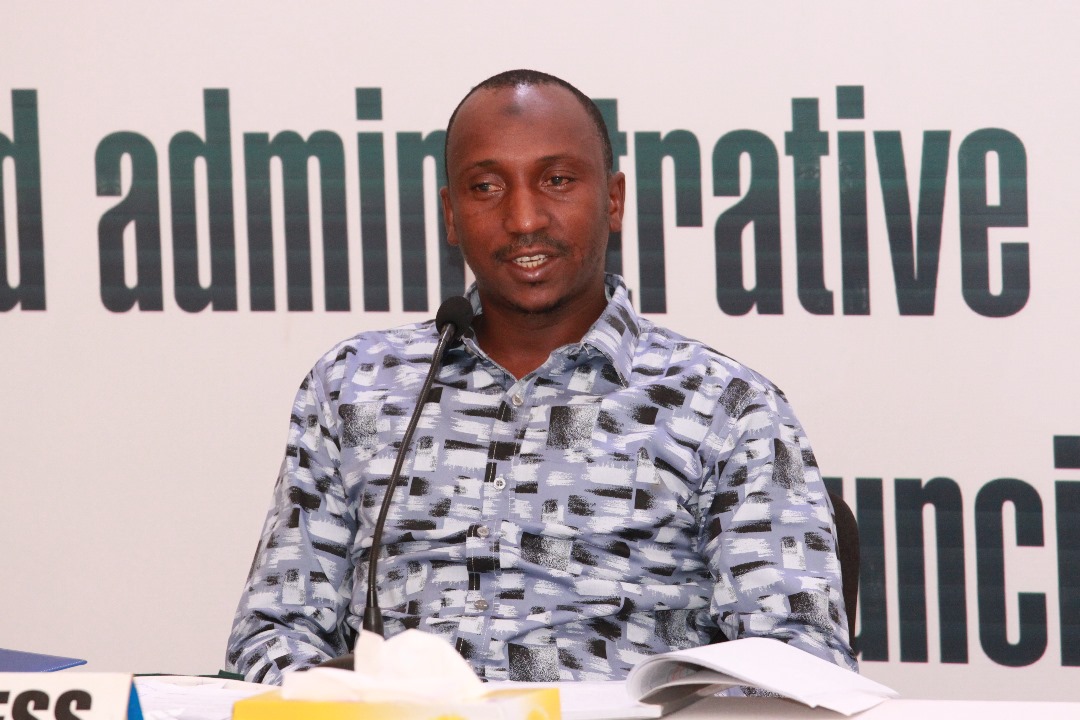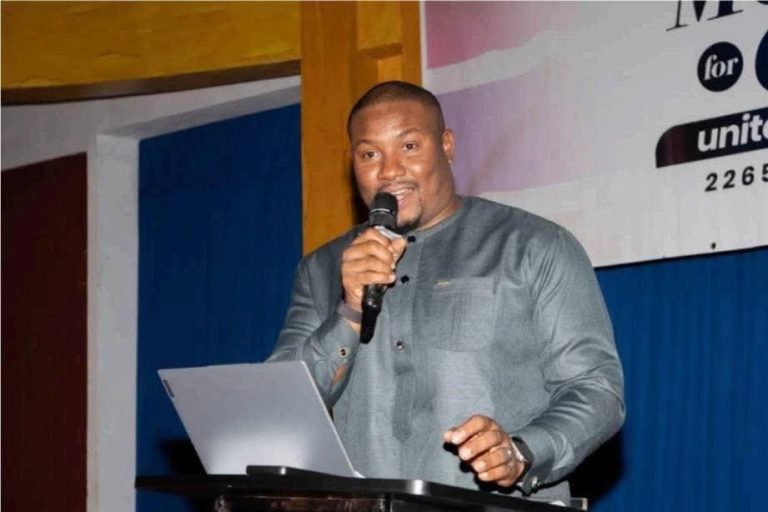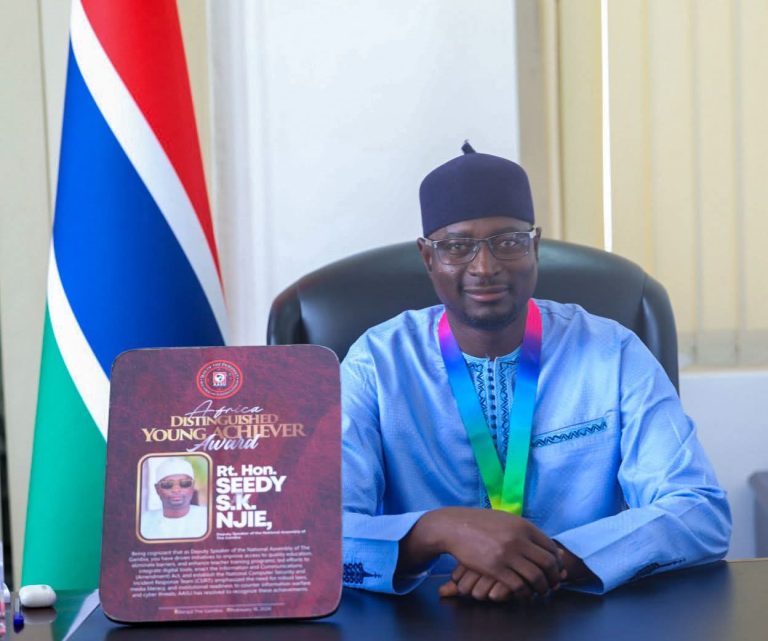
Yahya Bah, the Finance Manager of the Brikama Area Council (BAC), has given implicating testimony regarding financial malpractices that happened in the Council between May 2018 and January 2023. He appeared before the Local Government Commission of Inquiry on the 5th August 2024.
He gave a detailed testimony of lack of regard to the Financial Manual for Local Government Councils and related legislations. He testified that he had never seen the Financial Manual and he was not following it.
Yaya Bah, a resident of Sinchu Baliya, joined the Brikama Area Council on the 1st March 2005. The temporal appointment letter dated 20th February 2005 and the confirmation letter dated 1st September 2005 were both tendered and admitted in evidence.
The witness acquired a degree in accountancy from the University of The Gambia in 2021. The written statement of the witness dated 25th March 2024 was tendered and admitted in evidence. There were some payment vouchers attached to the statement.
The witness said he was promoted in 2012 as a Senior Accounts Clerk. He presented an appointment letter dated 1st March 2012. He testified that in 2018 he was redeployed in the Rates Unit as the Acting Rates Manager. He provided a letter of redeployment dated 28th June 2018. It was tendered and admitted in evidence. He said he held the position from 2018 to 2021. He added that the Local Government Service Commission was written to by the Brikama Area Council to confirm his appointment, but the Commission declined with the reason that he was not qualified. At the time he did not obtain a degree as he was still going to the University.
“My role was to make sure the rates and tax collectors do their work correctly,” the witness said.
“How do you do this?” Lead Counsel Patrick Gomez asked.
The witness said he used to give a piece of paper to the Principal Cashier, Lamin Kantong Kanteh, to write the names of the collectors who go for the weekly submission and reconciliation, and the amount submitted. He added that through that he would know the collectors who do not come for the submission on Thursday.
“I monitor their submissions,” the witness said.
“How do you monitor their submissions?” Counsel Gomez asked.
Yaya Bah said the collectors are required to come to the Council every Thursday for submission and through that he would know the amount each collector brings. Lead Counsel Gomez told him he should first know the amount each collector collected as revenue and then monitor their submissions.
“Do you know how much each collector collects on a weekly basis?” Gomez asked.
“No, I don’t,” the witness said.
Bah, who is now the Finance Manager of the Brikama Area Council, said he used to only rely on the list he got from Lamin Kantong Kanteh containing the names and amount each collector brings. He reiterated that he would not know how much each collector brings.
“Was that effective?” Gomez asked.
“No,” the witness replied.
Why?” Counsel Gomez asked.
“Best known to the collectors,” the witness answered
“But you were the manager,” Counsel Gomez told the witness.
This was the time the witness began his narration about his experiences in Implementing his oversight over the collectors. He explained that when he gets his piece of paper from the Principal Cashier containing the names, amounts and signature of the collectors who did the submission, he will then call those absent to enquire from them.
“When you call the collector, he will tell you I am sick or I have an urgent thing to attend to,” he said.
He said he would give the collector up to the following week to do the submission.
“I will give them a second chance – that is the following week Friday. If they do not come, I will go to their station and confiscate your cash book and receipt book. I will tell you to come to the office (Council) to do the submission before taking back the cash book and receipt. Until you come for submission, you will not get the books” he said.
He said at the time, he used to do it jointly with the Principal Cashier, Sulayman Barry.
The witness accused the Director of Finance, Alagie Jeng, of interfering in his work. He testified that the decision he took did not go down well with some people.
“I was not allowed to continue with that,” the witness said.
“Who did not allow you to continue?” the witness said.
“My superiors,” the witness replied.
“Who were your superiors,” Gomez asked.
The witness said he was directly under the Director of Finance.
“My Director told me you have to stop this. You have to be lenient with the collectors. You should not be harsh on them,” the witness said.
He testified that his boss, Alagie Jeng, asked him to stop what he was doing. He said the process lasted for only three (3) weeks before its untimely stop. He added that he used to have about thirty (30) collectors working in the Rates Unit. He was asked for the records he kept for his monitoring activity, but he said he did not keep records. Instead, he used to write a piece of paper. He testified that his monitoring system was not effective.
Lead Counsel Patrick Gomez told the witness that there were many collectors in the Rates Unit who, until now, did not account for their collections. He informed the witness that even during his time as the Acting Rates Manager, the collectors were defaulting in their submissions leading to shortages of cash otherwise cash suppression.
The witness claimed that he was not aware of the cash shortages by collectors who worked under him. Lead Counsel Gomez refuted that claim as he told the witness “That’s not true – it was common knowledge.” The witness, in turn, changed his statement and said some of the collectors who went for the weekly submissions used to have shortages.
The Counsel proceeded to question the witness about his financial dealings. The Commission noted that the witness withdrew a total of more than D11.4 million from the accounts of the Brikama Area Council. The witness, Yaya Bah, said most of the withdrawals were for salaries payment.
He was asked to explain how the salary payments were done in the Brikama Area Council. He explained that a voucher would be prepared by the account clerks and then taken to the Internal Audit Unit for pre-payment auditing and from there the voucher is taken to the Director of Finance.
“Have you raised vouchers for all these withdrawals?” Gomez asked.
“Yes,” the witness answered.
He was informed that he will be required to produce the vouchers in relation to his withdrawals. He was also referred to his own statement that he was not provided vouchers when going to do withdrawals. At this juncture, the witness testified that the Director of Finance used to dictate him and other accounts clerks the amount to write in the cheque and sometimes they used different cheques to do withdrawals for payments on the same day. For instance, if they want to pay salaries, he used to withdraw money from different banks.
“It will be difficult to link any of the withdrawals to the voucher because of the way he does the calculations,” the witness said.
“After preparing the voucher, that’s where I stop. I don’t scrutinise payments,” the witness added.
“My responsibility was to prepare vouchers,” the witness stated.
“Your responsibility was to check and scrutinise payments. That’s what the law says,” Gomez told the witness.
The witness explained that the vouchers that they used to give the auditors were not complete because they won’t indicate the total. He said the auditors would allow it to pass. He added that the Director of Finance was the one who does the calculations and dictates the amount to be indicated in the cheque for withdrawal. He added that the Director of Finance used to ask them to prepare different cheques for the payment of salary.
“I wouldn’t know how the Director of Finance arrives on those figures on the cheque. The amounts that I withdrew cannot be directly linked to the voucher,” the witness said.
“The amounts on the different cheques should be the same as the amount on the voucher,” Lead Counsel Gomez said.
“Yes, that should be. However, I don’t think they were the same,” the witness answered.7
He said the Director of Finance is the one who does the calculations and comes up with his own total.
The witness was referred to Section 206 of the Financial Manual for Local Government Councils regarding the duties of Senior Accounts Clerks. The duties included verification of the costing, preparation of the salary vouchers and scrutiny of cheques.
“You said you don’t know the total. Does it mean you were doing your job correctly?” Gomez asked.
“No,” the witness answered, adding that “I did not scrutinise the cheques.”
He stated that the circumstances prevailing at the time would not allow him to scrutinise the cheques. He added that he will find his name written on the cheque to make the withdrawal without any voucher or other supporting documents attached.
“Have you been withdrawing without vouchers?” Gomez asked.
“No, except for salary payments,” the witness answered.
“Are you saying you have vouchers for all these withdrawals?” the Counsel asked.
“Yes, except for the salary payments,” the witness said.
He was ordered to produce the vouchers to account for the withdrawals made. The witness began to make excuses.
“The idea now is that you are required to produce the vouchers for every withdrawal you made,” Lead Counsel Gomez said.
“I will not be able to do that,” the witness answered.
The witness said he will look for the vouchers. He later admitted that there were no vouchers for most of the withdrawal. He was asked why it took him so long to say that. He testified that he only takes the cheque written in his name.
“You don’t see the voucher,” the witness said.
Another role of the Senior Accounts Clerk is to post cash booms daily. The witness said he was not doing that.
The Commission noted that the witness continued with the salary payments even though he was no longer a Senior Accounts Clerk. At this time, he was the Rates Manager and there was already someone appointed as the Rates Manager. He said he stopped salaries in 2020. He admitted that he was still handling the salary payment even though he was already a Rates Manager.
“The status quo in the council was that you, as a junior officer, cannot challenge your seniors. If you do, you will be ultimately punished. In the Council, they have absolute power. It is either you do what they tell you or someone else will do it,” the witness said.
He mentioned that Lamin Suso, who was his junior in the Council, was promoted to a Finance Manager ahead of him. The reason he gave was because Suso was ready to do what he was instructed to do. On the other hand, the witness said he was seen as a difficult person. Hence, he was not promoted.
Lead Counsel Gomez returned to the issue of salary payment methods in the Council. He gave the witness the Financial Manual for Local Government Councils to state procedures provided by law. The witness said after preparing the voucher, it should go to the audit unit for pre-auditing, the Senior Accounts Clerk will enter the details in the various accounts books, then to the Director of Finance and onward submission to the CEO for approval, the voucher will be sent back to the Senior Accounts Clerk after approval and signature, who will pass the payment voucher and cheque to the Cashier for payment of salary.
“Definitely, this [procedure] was not followed,” the witness said.
The witness admitted that the recording system envisaged in the Financial Manual was different from the one they had.
He testified when he makes withdrawal, he brings the cash to the Council and hands it over to the Director of Finance. He said after handing over he would not know how the Director of Finance did with the money. Lead Counsel Patrick Gomez told the witness that the claim cannot save him because he has the responsibility under the law to know the reasons for the withdrawals by looking out for the supporting documents. Also, the law provides that the payment voucher should be prepared in the name of the supplier and not the accounts clerk.
The witness was asked about the issue of the hiring of the waste trucks amounting to D108,000. The Director of Finance was the only perspn who signed on that voucher. The payment was for the transportation of waste from Sukuta. Chairperson Jainaba Bah noted that the voucher was without a number, which makes it an anomaly. The witness confirmed this.
“This is not correct, definitely, “ the witness said.
“This is how you people were operating,” Chairperson Bah said.
“Yes,” the witness answered.
The witness was questioned about his D150,000 loan. He said he took it with the plan of purchasing a plot of land, but the amount given to him was not sufficient to buy the land. He decided to deposit the amount in his bank account. He claimed that he is still servicing the loan. He admitted before the Commission that he only sent an application letter and he was provided the loan.
“I did not sign any document,” the witness said, adding that “There was no loan policy.”
He explained that when he applied, the CEO used his discretion to approve it.
Another voucher they reviewed was for the payment of 6 months arrears for the IFMIS allowances. The witness said gave the D45,000 of Accounts Clerk Omar Saidykhan IFMIS payment to Alagie Jeng. He added Omar did not receive it directly from him. Chairperson Jainaba Bah asked the witness why they continued to pay themselves IFMIS allowances when they were not using it. Instead, they continued to use the Matrix System. The witness admitted that the payments they were receiving were wrong.
He was asked about his withdrawals from the GTBank account of the Brikama Area Council. On the 26 June 2018, the witness withdrew D70,000, on the 28 July 2018, he withdrew D478,000 through cheque and made a cash withdrawal of D270,970, on the 3 August 2018 and he withdrew D400,000.
“There were no supporting documents for all these withdrawals,” the witness said.
“You were just asked to withdraw and you went ahead to withdraw,” Lead Counsel Patrick Gomez asked the witness.
“Yes,” the witness replied.
The witness restated that the Director of Finance was the one who used to come up with figured and would dictate it to them to write on the cheques. Chairperson Jainaba Bah told the witness as an accountant he was supposed to know that it was wrong to know that it was wrong go be provided rounded figures to withdraw without properly scrutinising the cheques and the vouchers.
“How he gets those figures, we wouldn’t know. He will ask us to write a cheque and he will tell us the amount. Sometimes, for one transaction, we make more than two (2) withdrawals. Sometimes we make 3 to 4 withdrawals for one transaction,” the witness said.
He was reminded of his duty as enshrined in the Financial Manual to scrutinise cheques and payments. The witness testified that he used to assume that the withdrawals were for salary payments. Chairperson Jainaba Bah told the witness that the assumption was not tenable because it is something that continued until today; that cheques would be written in the names of staff of the Council to withdraw without supporting documents and the accounts clerks would not also properly scrutinise the payments. The witness said he was not scrutinising the cheques because his superiors were “powerful” and he felt that it was best not to do that.




